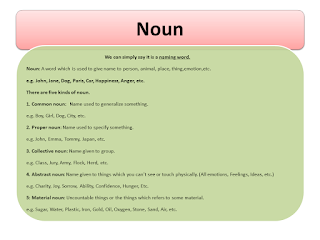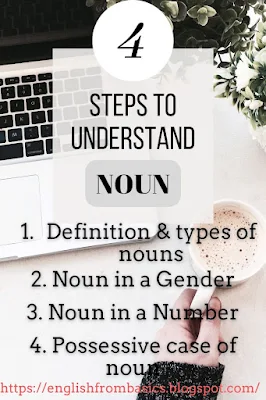Table of content
1. Introduction
2. What Are Nouns?
3. Types of Nouns
4. Noun in a Gender
5. Noun in a Number
6. Possessive case of noun
7. Functions of Nouns
8. Importance of Nouns
9. Noun Worksheet/ Exercise
Noun: The Heart of Language
Definition :
A word which is used to give name to a person, animal, place, thing, emotion, etc. is called as noun. We can simply say it is a naming word. Noun acts a subject or a object in sentence.
e.g. John, Jane, Dog, Paris, Car, Happiness, Anger, etc.
1. Introduction
Nouns are the heart and soul of language, the sturdy pillars on which sentences are built. These words are the names of people, places, things, and ideas that surround us every day. Whether you're chatting with friends, writing a story, or describing your favorite things, nouns are the stars of the show. In this friendly guide, we'll embark on a journey through the fascinating world of nouns, exploring their types, functions, and the vital role they play in making our language meaningful.
2. What Are Nouns?
Nouns are essential parts of speech that name people, places, things, or concepts. They are the building blocks of communication, giving us a way to refer to everything in our world. Without nouns, language would lack meaning, and we wouldn't be able to express our thoughts, share stories, or connect with others.
3. Types of Nouns
Nouns come in various shapes and sizes, each serving a unique purpose in our language. Let's explore the different types of nouns:
There are five kinds of nouns.
1. Common Noun:
These are everyday nouns that refer to general people, places, things, or ideas. Examples include "cat," "city," "book," and "love."
In simple words, "
e.g. Boy, Girl, Dog, City, etc.
2. Proper Noun:
Proper nouns are specific names given to particular people, places, or things. They always start with capital letters. Examples include "John," "Paris," "Harry Potter," and "Eiffel Tower."
In simple words "Name used to specify something."
e.g. John, Emma, Tommy, Japan, etc.
3. Abstract Noun:
Abstract nouns, on the other hand, are intangible and represent ideas, emotions, or qualities. Examples include "freedom," "happiness," "love," and "courage."
In simple words "Name given to things which you can't see or touch physically." (All emotions, Feelings, Ideas, etc.)
e.g. Charity, Joy, Sorrow, Ability, Confidence, Hunger, Etc.
4. Collective Noun:
Collective nouns refer to groups of people or things. Examples include "family," "team," "herd," and "flock."
e.g. Class, Jury, Army, Flock, Herd, etc.
5. Uncountable Noun:
Uncountable nouns, also known as mass nouns, cannot be counted individually. They refer to substances or concepts that are viewed as a whole. Examples include "water," "sugar," "information," and "advice."
In simple words "Uncountable things or the things which refers to some material."
e.g. Sugar, Water, Plastic, Iron, Gold, Oil, Oxygen, Stone, Sand, Air, etc.
4. Noun in a Gender
1. Masculine:
A word which refers to male animals and male persons.
e.g. Boy, Hero, King, Lion, Father, Man, Uncle, etc.
2. Feminine:
A word which refers to female animals and female persons.
e.g. Girl, Heroine, Queen, Lioness, Mother, Woman, Aunt, etc.
3. Common :
A word which refers to both masculine & Feminine.
e.g. Doctor, Baby, Cousin, Child, Friend, Manager, Teacher, Relative, etc.
4. Neuter :
A word which refers to things or objects.
e.g. Pen, Pencil, Eraser, Book, Table, Chair, Bus, Car, Tree, etc.
5. Noun in a Number :
1. Singular -
- Noun which refers to one (e.g. Pen, Book, Boy, Girl, Story, etc.).
2. Plural -
- Noun which refers to two or more than two (e.g.Pens, Books, Boys, Girls, Stories, etc.).
- When we make plural from singular there are some rules to be followed.
Rules to make plural from singular
e.g. Car - Cars, Page - Pages, Drink - Drinks, Coin - Coins, Hand - Hands, etc.
e.g. Bench - Benches, Bush - Bushes, Box - Boxes, Mango - Mangoes, Guess - Guesses, etc.
e.g. Lady - Ladies, Baby - Babies, Pony - Ponies, etc.
e.g. Life - Lives, Wife - Wives, Leaf - Leaves, Shelf - Shelves, Half - Halves, etc.
e.g. Child - Children, Mouse - Mice, Tooth - Teeth, Man - Men, Woman - Women, etc.
e.g. Sheep - Sheep, Deer - Deer, Aircraft - Aircraft, Fish - Fish, etc.
Note : There are exceptions also like Photo - Photos, etc. There are other rules also.
6. Possessive case of noun :
1. To show the possession of noun add apostrophe s ('s) at the end of noun.
e.g. John's bicycle, Romana's purse, Children's hospital, etc.
2. If noun is plural and ends with "s" put apostrophe after the "s". There is no need to add "s" again.
e.g. Boys' hostel, Girls' room, etc.
3. To show the possession of things use "of" with noun.
e.g. Handle of door, Cover of book, door of a car, etc.
7. Functions of Nouns
Nouns have vital roles in our language, and their functions go beyond just naming things. Let's explore some of their key functions:
1. Subject of a Sentence:
Nouns often act as the subject of a sentence, performing the action or being described. For example, "Tom plays soccer."
2. Object of a Verb:
Nouns can also be the object of a verb, receiving the action. For example, "She read the book."
3. Object of a Preposition:
Nouns can be the object of a preposition, showing the relationship between elements in a sentence. For example, "He sat on the chair."
4. Possession:
Nouns indicate ownership or possession. For example, "The cat's toy" shows that the toy belongs to the cat.
5. Complement:
Nouns can act as complements, providing more information about the subject or object. For example, "She is a doctor."
8. Importance of Nouns
Nouns are the glue that holds our language together. Without them, sentences would be incomplete and lacking in meaning. Nouns allow us to identify and refer to people, places, and things, bringing clarity and specificity to our communication.
Nouns are the stars that shine brightly in the galaxy of language. They are the names, the labels, and the storytellers that enable us to express ourselves, share our experiences, and connect with others. From common to proper, concrete to abstract, countable to uncountable, nouns come in various forms, enriching our language and making communication meaningful. So, let's celebrate the power of nouns and embrace their essential role in the beautiful tapestry of language!
9. Noun Worksheet/ Exercise
Instructions: Read each sentence carefully and identify the nouns. Write the nouns you find in the space provided.
1. The cat chased the mouse.
Nouns: _________________
2. My sister baked a delicious cake for my birthday.
Nouns: _________________
3. The sun was shining brightly in the sky.
Nouns: _________________
4. We went to the park and played on the swings.
Nouns: _________________
5. The teacher gave us a challenging assignment to complete.
Nouns: _________________
6. The mountain climbers reached the summit after a long
journey.
Nouns: _________________
7. Birds chirped merrily in the trees outside my window.
Nouns: _________________
8. My grandfather always tells interesting stories about his
childhood.
Nouns: _________________
9. The raindrops fell softly on the roof of the house.
Nouns: _________________
10. The students eagerly awaited the results of their exams.
Nouns: _________________
Answers:
- Nouns: cat, mouse
- Nouns: sister, cake, birthday
- Nouns: sun, sky
- Nouns: park, swings
- Nouns: teacher, assignment
- Nouns: mountain, climbers, summit, journey
- Nouns: Birds, trees, window
- Nouns: grandfather, stories, childhood
- Nouns: raindrops, roof, house
- Nouns: students, results, exams



No comments:
Post a Comment